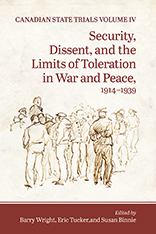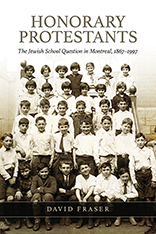A reception was held at Osgoode Hall in Toronto this evening to launch the Society's four publications for 2015. Remember, the member's book comes free with your membership. This year's member's book is Security, Dissent and the Limits of Toleration in War and Peace: Canadian State Trials Volume IV, 1914-1939 (details below.) All of our books make great presents for the legally, historically or legal-historically minded people on your list. Many of our back titles are also available for purchase.
The 2015 books are:
Law and Life at Red River: The General Quarterly Court of Assiniboia 1844-1872
By Dale Gibson, Emeritus Professor of Law, University of Manitoba.
The General Quarterly Court of Assiniboia can justly be called the first ‘British’ court in western Canada. Although there were predecessor institutions and judicial arrangements for hearing criminal and civil cases, the establishment of the Quarterly Court in the 1830s put the administration of justice in the Red River region on a firm and regularised footing.
Professor Gibson’s comprehensive history of the Court weaves together the legal history of Red River with its social, economic, and political history. At the centre piece of this book sits the complete court proceedings of the General Quarterly Court from 1844 until 1872, which are examined in detail and in context to provide a compelling narrative of the administration of substantial rather than formal justice in a Company community.
A Thirty Years War: The Failed Public/Private Partnership that Spurred the Creation of the Toronto Transit Commission, 1891-1921
by Ian Kyer, Independent Historian. Published by Irwin Law.
The thirty year franchise granted by the City of Toronto to the privately owned Toronto Railway Company in 1891 brought the City a modern electric streetcar system. But the city and its private sector transit provider never learned to work together. Their relationship was marred by almost constant conflict and confrontation that resulted in numerous court battles. Fourteen times these court battles ended up at the Judicial Committee of the Privy Council. This book details these legal disputes, and will be of interest not only to legal historians but also to those interested in transit and municipal history.
Security, Dissent and the Limits of Toleration in War and Peace: Canadian State Trials Volume IV, 1914-1939
Edited by Barry Wright, Department of Law, Carleton University, Eric Tucker, Osgoode Hall Law School, andSusan Binnie, Independent Historian, published by the University of Toronto Press.
 This latest collection in our State Trials series, the fourth, looks at the legal issues raised by the repression of dissent from the outset of World War One through the 1930s and the Great Depression. Topics covered include enemy aliens, conscription and courts-martial in World War I, the trials following the Winnipeg General Strike, sedition laws and prosecutions generally and their application to labour radicals in particular, the 1931 trial of the Communist Party leaders, and the religious-political dissent of the Doukhobors. All regions of the country are covered, and special attention given in one essay to Quebec’s repression of radicalism.
This latest collection in our State Trials series, the fourth, looks at the legal issues raised by the repression of dissent from the outset of World War One through the 1930s and the Great Depression. Topics covered include enemy aliens, conscription and courts-martial in World War I, the trials following the Winnipeg General Strike, sedition laws and prosecutions generally and their application to labour radicals in particular, the 1931 trial of the Communist Party leaders, and the religious-political dissent of the Doukhobors. All regions of the country are covered, and special attention given in one essay to Quebec’s repression of radicalism.
The volume focusses attention on older manifestations of contemporary dilemmas: what are the acceptable limits of dissent in a democracy, and what limits should be placed on state responses to perceived challenges to its authority.
“Honorary Protestants”: The Jewish School Question in Montreal, 1867-1997
By David Fraser, Professor of Law, University of Nottingham, published by the University of Toronto Press.
 Section 93 of the Constitution Act 1867 guaranteed certain educational rights to Catholics and Protestants in Quebec, but not to anybody else. This study of the challenges, legal and otherwise, encountered by Jewish parents in educating their children in Montreal in the shadow of s. 93, will undoubtedly become the standard work on the subject. Faced with alternating periods of hostility and tolerance, the Jewish community of Montreal carved out an educational modus vivendi based on complex and continuing negotiations with the Protestant and Catholic school boards, the provincial government, and individual municipalities. Divisions within the Jewish community itself, with different groups alternating between cooperation and militancy, only added to this complexity. In the face of the constitution’s exclusionary language, all parties engaged in modes of informal normative ordering that were at times frankly unconstitutional, but unavoidable if Jewish children were to have access to public schools. Bargaining in the shadow of the law, the parties made their own constitution long before the constitutional amendment of 1997 finally put an end to the Jewish school question.
Section 93 of the Constitution Act 1867 guaranteed certain educational rights to Catholics and Protestants in Quebec, but not to anybody else. This study of the challenges, legal and otherwise, encountered by Jewish parents in educating their children in Montreal in the shadow of s. 93, will undoubtedly become the standard work on the subject. Faced with alternating periods of hostility and tolerance, the Jewish community of Montreal carved out an educational modus vivendi based on complex and continuing negotiations with the Protestant and Catholic school boards, the provincial government, and individual municipalities. Divisions within the Jewish community itself, with different groups alternating between cooperation and militancy, only added to this complexity. In the face of the constitution’s exclusionary language, all parties engaged in modes of informal normative ordering that were at times frankly unconstitutional, but unavoidable if Jewish children were to have access to public schools. Bargaining in the shadow of the law, the parties made their own constitution long before the constitutional amendment of 1997 finally put an end to the Jewish school question.
No comments:
Post a Comment